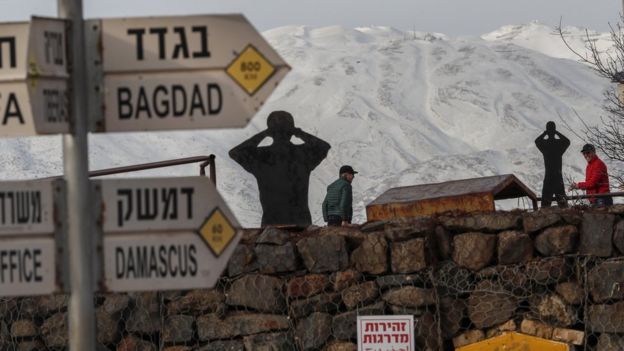Israel targets Iranian ground assets
January 22, 2019 | Expert Insights

Israel says it has hit Iranian targets around the Syrian capital, Damascus. The Israel Defense Forces say the overnight operation targeted the elite Quds Force of the Iranian Revolutionary Guards, as well as Syrian air defences.
Background
The Syrian Civil War has been going on since 2011. It began during the Arab Spring protests, due to resentment towards the government of President Bashar al-Assad. The war is being fought by several factions: the Syrian government and its allies, a loose alliance of Sunni Arab rebel groups (including the Free Syrian Army), the majority-Kurdish Syrian Democratic Forces (SDF), Salafi jihadist groups (including al-Nusra Front) and the Islamic State of Iraq and the Levant (ISIL), with a number of countries in the region beyond being either directly involved, or rendering support to one or another faction.
After the Iranian revolution in 1979, Ayatollah Khomeini came into power. He did not like Israel’s friendly equation with the previous regime. He declared that Israel was an enemy to Islam.
The already tense relations further deteriorated during the 90s. The two nations started fighting in proxy wars against one another during the tenure of Mahmud Ahmedinijiad, the President of Iran from 2005 to 2013. The two countries are also locked in conflict Syria.
Israel is said to have carried out three specific airstrikes targeting Iranians during the Gaza conflict. The two nations have since blamed one another for terror attacks, assassination, cyberattacks and more.
In 2017, Mossad chief Yossi Cohen said, "As long as the current regime exists, with the nuclear agreement or without it, Iran will continue to serve as the main threat to Israel's security.” In 2017, Benjamin Netanyahu, the Prime Minister of Israel said that Iran is setting up sites in Syria and Lebanon to produce missiles. Netanyahu noted that Syria was being turned into a base of military entrenchment with the aim of attacking Israel.
Analysis
The Syrian military says it shot down most of the Israeli missiles. But a monitoring group reported that at least 11 pro-government fighters were killed. The IDF says it acted after the Quds Force fired a rocket from Syria towards the occupied Golan Heights.
The IDF rarely admits carrying out attacks inside Syria. But it announced a start of the strikes on the Quds Force in a tweet. The operation came a day after the IDF said the Quds Force had launched an Iranian-made surface-to-surface rocket from Syrian territory towards the northern Golan Heights, which was intercepted by the Iron Dome air defence system.
A statement issued later said Israeli fighter jets had hit munition storage sites, a site located in Damascus International Airport, an Iranian intelligence site and an Iranian military training camp. The jets also struck several Syrian military air defence batteries after dozens of surface-to-air missiles were launched "despite clear warnings", it added.
"Syria is paying the price for allowing Iran to further its expansionist policies on Syrian soil," IDF spokesman Lt Col Jonathan Conricus said. "The IDF is determined to continue to defend Israeli civilians and sovereignty against Iranian aggression."
The Syrian Observatory for Human Rights, a UK-based monitoring group, reported that weapons depots and positions belonging to Iranian forces and the Iran-backed Lebanese militant group, Hezbollah, were hit. It said at least 11 fighters, including two Syrians, were killed. Syria's state-run Sana news agency quoted a military source as saying it "confronted an Israeli attack" and "prevented it from achieving its objectives".
"Our air defences dealt with the situation and intercepted the hostile missiles, downing most of them before reaching their targets as they continue their heroic response to the aggression," the source added, without mentioning any casualties.
The Russian military, which like Iran, also backs the Syrian government, said more than 30 missiles and guided bombs were shot down. However, it added that the "infrastructure" of Damascus International Airport was partially damaged and that four Syrian soldiers were killed and six wounded.
Assessment
Our assessment is that both Iran and Israel are standing at the edge of a larger conflict that could embroil most of Middle East. We believe that neither nation seems intent on fighting an open war but sense that even a small accident could trigger a conflict during this tense period in Syria.








Comments